Intro
Discover effective pregnancy insomnia relief techniques, including sleep hygiene, relaxation methods, and natural remedies to alleviate sleep deprivation and promote restful nights during pregnancy.
Pregnancy is a life-changing experience that brings about numerous physical and emotional transformations. While it can be a joyful time, it also comes with its fair share of challenges, including insomnia. Pregnancy insomnia relief is a topic of great interest for many expectant mothers who struggle to get a good night's sleep. Insomnia during pregnancy can be caused by a variety of factors, including hormonal changes, discomfort, and anxiety. As a result, it is essential to understand the causes of insomnia during pregnancy and explore effective ways to manage it.
As the body undergoes significant changes during pregnancy, it is not uncommon for women to experience difficulty sleeping. The growing belly, back pain, and frequent trips to the bathroom can make it challenging to get comfortable and relax. Furthermore, the emotional rollercoaster of pregnancy, including anxiety and excitement, can also interfere with sleep patterns. It is crucial to address insomnia during pregnancy, as it can have a significant impact on both the mother's and the baby's health. Chronic sleep deprivation can lead to fatigue, mood swings, and decreased immune function, making it harder for the body to cope with the demands of pregnancy.
The importance of addressing insomnia during pregnancy cannot be overstated. Sleep plays a critical role in physical and emotional well-being, and its absence can have far-reaching consequences. Expectant mothers who experience insomnia are more likely to develop depression, anxiety, and other mental health issues. Moreover, sleep deprivation can increase the risk of pregnancy complications, such as preeclampsia and gestational diabetes. Therefore, it is essential to explore effective strategies for pregnancy insomnia relief, ensuring that expectant mothers get the restful sleep they need to maintain their physical and emotional health.
Pregnancy Insomnia Causes
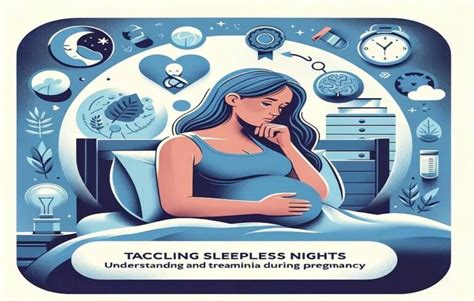
Physical Discomforts
Physical discomforts are a significant contributor to pregnancy insomnia. As the belly grows, it can put pressure on the back, hips, and joints, making it challenging to find a comfortable sleeping position. Furthermore, the increasing weight can cause back pain, sciatica, and other musculoskeletal issues. Other physical discomforts, such as heartburn, nausea, and frequent urination, can also disrupt sleep patterns. It is essential to address these physical discomforts to improve sleep quality and duration.Pregnancy Insomnia Symptoms
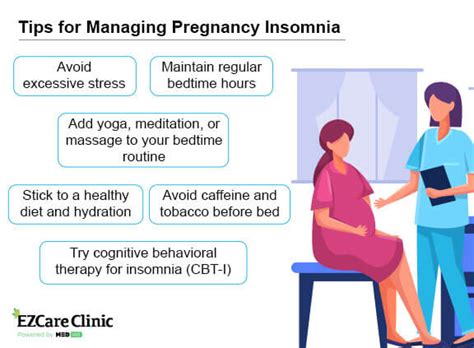
Emotional Factors
Emotional factors, such as anxiety and stress, can also contribute to pregnancy insomnia. Expectant mothers may worry about the baby's health, their ability to parent, and the impending changes in their life. These emotional concerns can make it challenging to relax and fall asleep, leading to chronic sleep deprivation. It is essential to address these emotional factors through relaxation techniques, counseling, and social support.Pregnancy Insomnia Relief Strategies
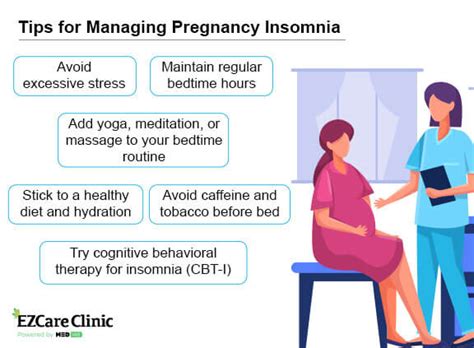
Lifestyle Modifications
Lifestyle modifications can play a significant role in managing pregnancy insomnia. Expectant mothers can start by avoiding caffeine, nicotine, and electronics before bedtime, as these can disrupt sleep patterns. Engaging in regular exercise, such as walking or swimming, can also help to improve sleep quality and duration. Additionally, maintaining a healthy diet, rich in fruits, vegetables, and whole grains, can provide the necessary nutrients for optimal sleep.Pregnancy Insomnia Treatment Options
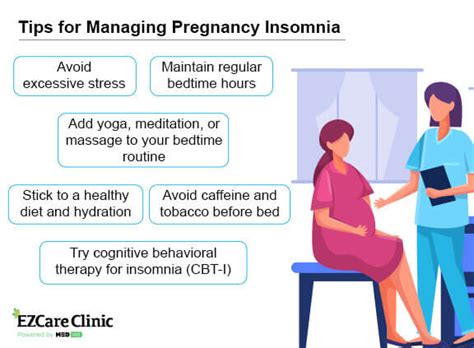
Professional Help
Professional help can be invaluable in managing pregnancy insomnia. Expectant mothers can consult their healthcare provider about their sleep concerns and receive personalized guidance and support. A healthcare provider can help identify underlying causes of insomnia and recommend effective treatment options. Additionally, support groups and online forums can provide a sense of community and connection, helping expectant mothers to cope with the challenges of pregnancy insomnia.Pregnancy Insomnia Prevention
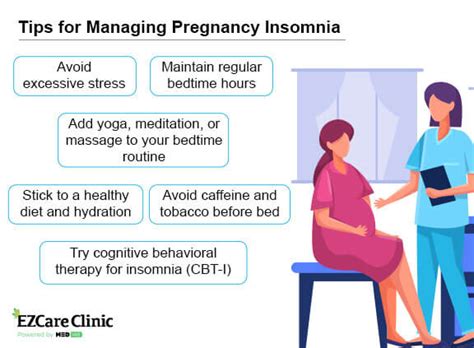
Healthy Sleep Habits
Healthy sleep habits are essential for preventing pregnancy insomnia. Expectant mothers can start by creating a sleep-conducive environment, such as keeping the bedroom cool, dark, and quiet. Avoiding electronics before bedtime, such as smartphones and tablets, can also help to prevent sleep disturbances. Additionally, establishing a consistent sleep schedule and avoiding naps during the day can help to regulate the body's internal clock.What are the most common causes of pregnancy insomnia?
+The most common causes of pregnancy insomnia include hormonal changes, discomfort, and anxiety. Physical discomforts, such as back pain and frequent urination, can also disrupt sleep patterns.
How can I prevent pregnancy insomnia?
+Preventing pregnancy insomnia involves establishing healthy sleep habits, such as maintaining a consistent sleep schedule, creating a sleep-conducive environment, and avoiding stimulants before bedtime. Engaging in regular exercise, practicing relaxation techniques, and maintaining a healthy diet can also help to prevent sleep disturbances.
What are the treatment options for pregnancy insomnia?
+Treatment options for pregnancy insomnia may include cognitive-behavioral therapy for insomnia (CBT-I), sleep aids, such as melatonin or valerian root, and lifestyle modifications. It is essential to consult a healthcare provider before starting any treatment.
In conclusion, pregnancy insomnia is a common challenge that many expectant mothers face. Understanding the causes, symptoms, and treatment options can help individuals manage their sleep disturbances and promote overall health and well-being. By establishing healthy sleep habits, practicing relaxation techniques, and seeking professional help when needed, expectant mothers can improve their sleep quality and duration, ensuring a healthier and happier pregnancy experience. We invite you to share your thoughts and experiences with pregnancy insomnia in the comments below, and don't forget to share this article with anyone who may benefit from it.
